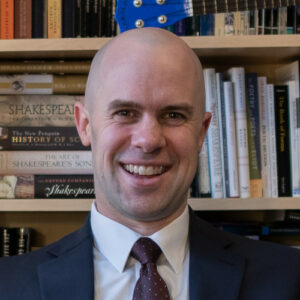On Artificial Intelligence, The Sorcerer’s Apprentice, and the Risks of Playing with Magic
The Apprentice
When I uploaded to ChatGPT a picture of my family taken at a screening of Taylor Swift’s “Eras” Tour, and asked ChatGPT simply to “write a poem about the attached picture,” and when it returned to me a sonnet describing my wife and children wearing “Swiftie” shirts in front of a poster of the singer herself, capturing the mix of love, fandom, and family, I couldn’t help but pause to appreciate what an incredible time we are living in. Today’s technology surely is magical.
I’ve been thinking a lot recently about another magical moment: Disney’s 1940 release of Fantasia, which includes the nine-minute short film “The Sorcerer’s Apprentice.” The animated film recently celebrated its 80th anniversary, but the story is actually much, much older. And it might as well be a cautionary tale for our present moment. I think of it as a case study in the dangers of playing with magic.
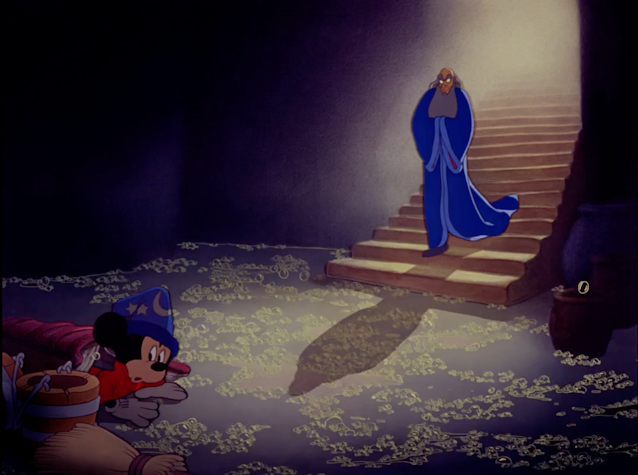
The Story
Link: The Sorcerer’s Apprentice, from Disney’s Fantasia – Disney.com
For those who have not seen Mickey Mouse’s escapade in the Sorcerer’s lab, the animated short film is viewable for free at Disney Video at the link above. But to summarize it, I’ve included frames from the film below. The action unfolds as follows:
Mickey Mouse is the apprentice to a powerful sorcerer.
Mickey’s job is to fill buckets with water from one well and pour them into another well.
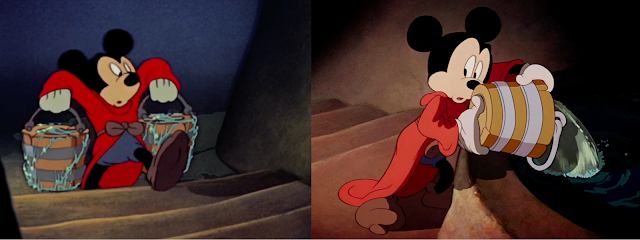
One day, the powerful sorcerer grows tired, leaves for the day, and leaves his magical hat behind.
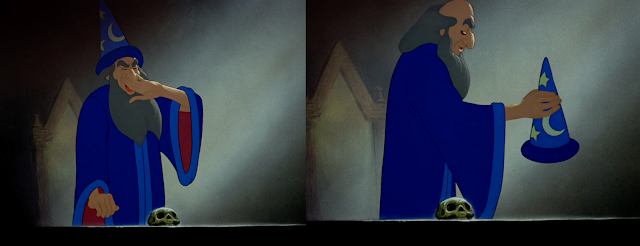
You can guess where this goes.
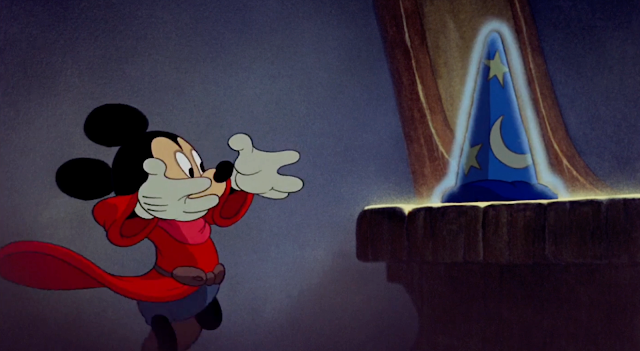
Mickey puts on the hat, and charms a broom.
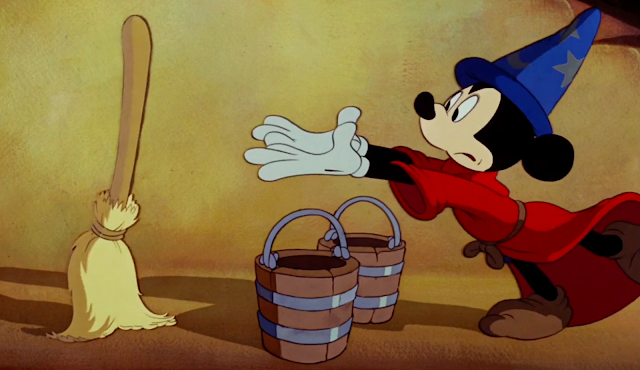
He makes it grow arms.
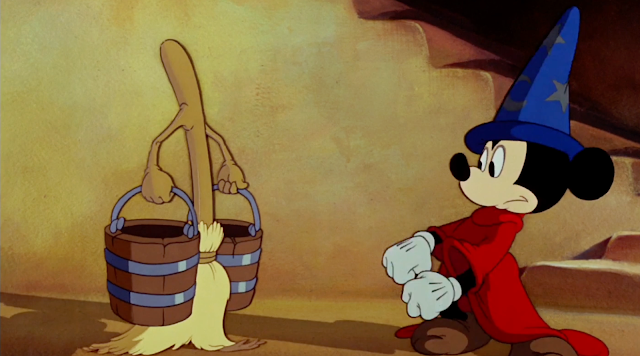
He teaches it to do his work.
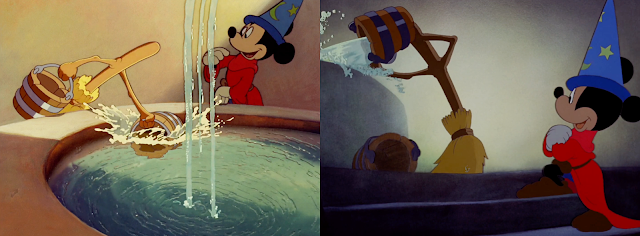
Mickey, in his leisure now, then falls asleep.
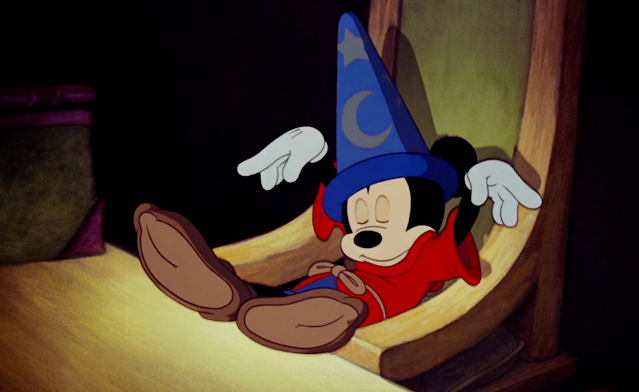
He dreams of great power.
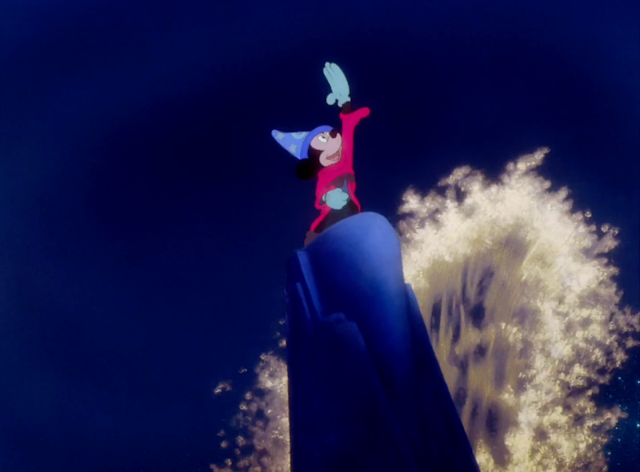
He awakens to find the sorcerer’s workroom flooded.
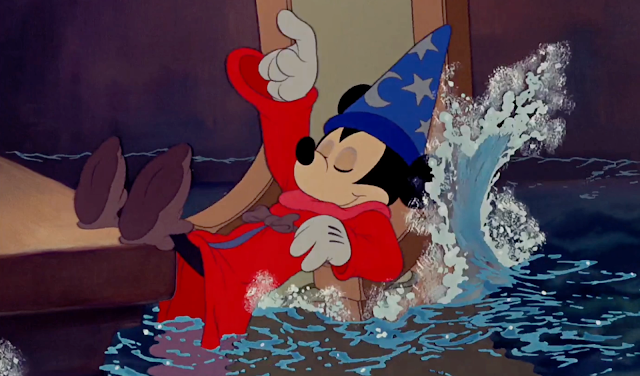
The broom filled the well and kept going. So Mickey tries to stop the broom.
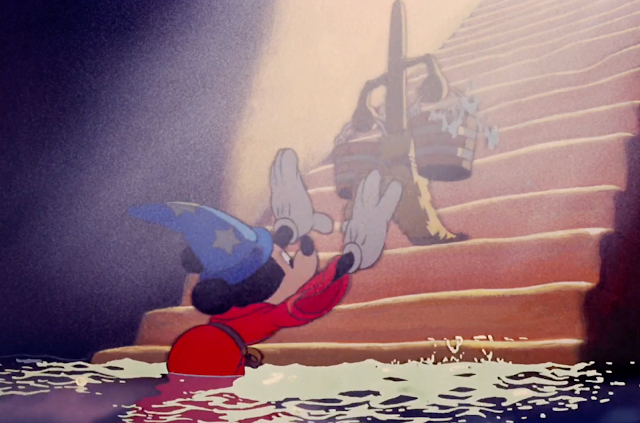
But finds he does not have the power.
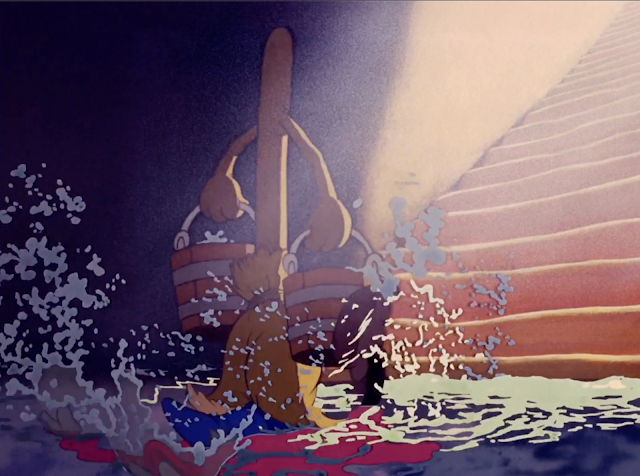
In desperation, Mickey grabs an axe and chops the broom to splinters.
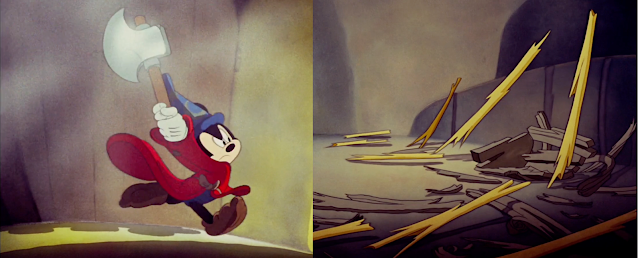
But the magic of the broom transforms each wood splinter into a new broom.
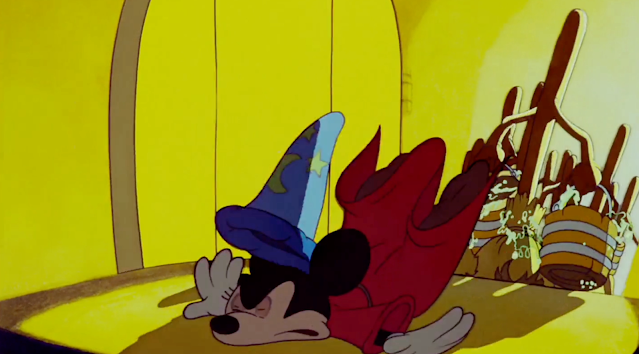
Now, the army of brooms fills their buckets and keeps overflowing the well, flooding the lab.
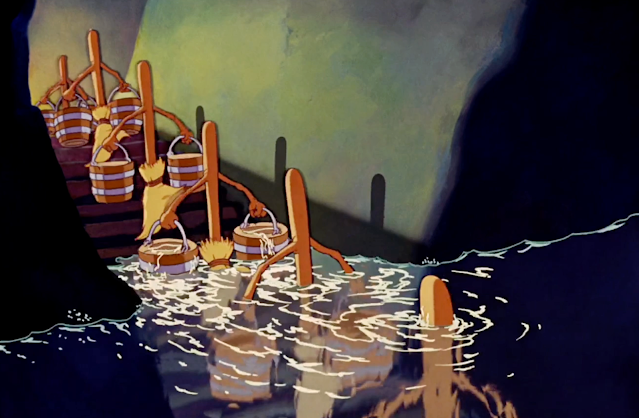
Just when all is almost lost, the sorcerer returns.
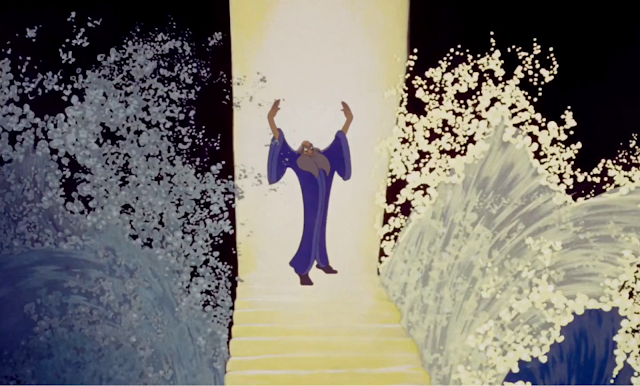
Furious, he dispels the magic and clears the water — even without the hat.
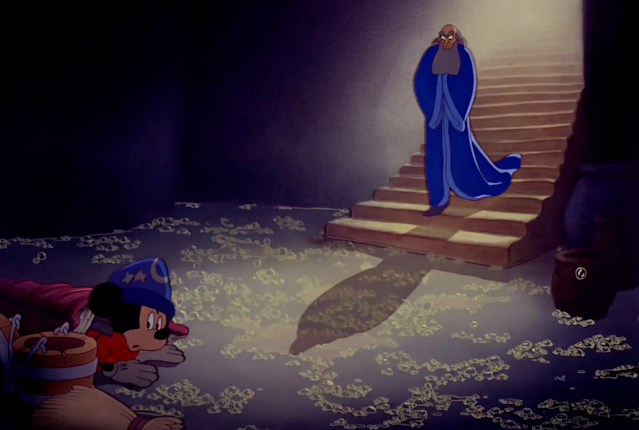
Mickey shamefully returns the hat.
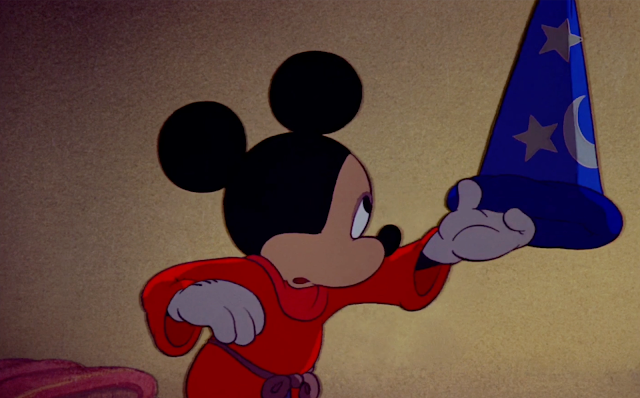
Mickey tries to make amends, but ultimately picks up the buckets and hands the broom back. And the sorcerer sweeps him out of the lab, notably, with the broom, the very object Mickey had enchanted.
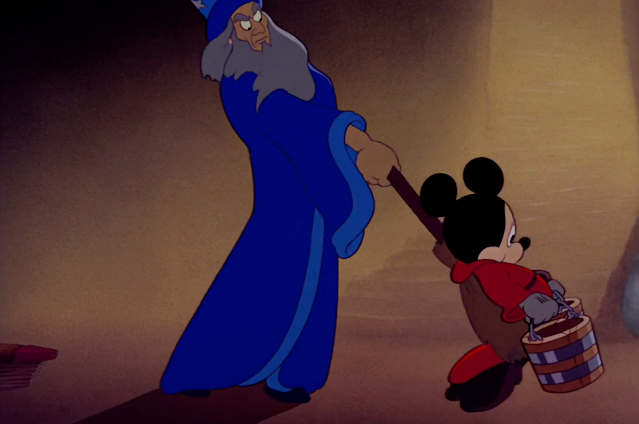
Mickey has made a mess, and the tale is clearly a cautionary one. “Don’t play with magic that you don’t understand,” it tells us. But what further nuance can be drawn from this, especially in relation to our current moment with artificial intelligence?
The Questions
I think of it as a story of unintended consequences: Mickey’s clear instructions to the broom only partially play out the way he hopes. The brooms don’t stop when the well is full, so the well overflows, and then destroying the broom creates more brooms, compounding the problem and flooding the entire laboratory.
The source of the disaster is because of three shortcomings on Mickey’s part. First, Mickey does not set boundaries on his work like the sorcerer does. He doesn’t give the broom instructions for when they task is done. Second, Mickey is unaware of the nature of the magic he wields; he does not realize that new brooms will grow from each of the splinters. And third, Mickey is careless. He doesn’t pay attention to what he has created, and he falls asleep at work.
The story and circumstance raise provocative questions when we consider them in our context:
Who are we in the story? And who are the other characters?
Are we the sorcerer, with our students and our children as the apprentices playing with artificial intelligence? Or are we Mickey, the eager apprentice, playing with something beyond our command? Or are we actually the broom, an everyday object enchanted with magic and marching along to someone else’s dubious direction?
But then who are the tech companies making these magical tools? Are they the sorcerer, carefully commanding and shaping new magic? Or are they actually Mickey, playing with the magical properties of physics, mathematics, electricity, and the universe? Who — or what — then would be the sorcerer, and how might we then interpret the sorcerer’s intervention at the end?
Do we understand the magic we wield?
Do we as consumers know how artificial intelligence works? Do we know its limits? If we turn it on, do we know how to turn it off? What would that look like for us as educators, parents, or citizens?
And what about the tech companies? Do they understand the tools they are creating? Even the developers of the generative AI tools we are using today were surprised by what they can do. There is even a term used in the tech field — “emergent abilities” — to describe capabilities that designers did not anticipate. What does this suggest about their own command of their creations?
Further, there is a polarizing debate unfolding today in public over the scale of risks of artificial intelligence. The facts of this debate are contested, but the fact that the debate is happening exposes the uncertainty in the designers of the technology themselves.
Can we set boundaries on our magic?
This is perhaps the most practical of the main questions. And perhaps this can drive us to the most constructive questions. The sorcerer in the film is shown to take great care with the magic that he experiments with. He appears to command it with responsibility and seriousness. How can we emulate this? How much power do we have over the technology that we are using? How responsible and serious are the creators of our artificial intelligence today?
And how do we analogize the sorcerer’s very prudent decision to restrict his apprentice Mickey from using the same magic? Should magic be in the hands of apprentices? Who are the apprentices? Students? Citizens? Other countries?
These are ethical, social, and professional questions that drive us to consider how we might most responsibly engage our new word. And they are questions that our students are hungry to engage, too.
Peter Nilsson is a Senior Consultant with Aptonym.
His experience includes independent school leadership and teaching positions, among other innovative roles focused on innovation in education. He is the founder of Athena, a resource and collaboration hub for teachers, and is the editor and curator of the newsletter The Educator’s Notebook. Peter also serves on the Advisory Board for SXSWedu and the Center for Curriculum Redesign.
In his own words, Peter is “an educator committed to learning and making the world a better place.” Connect with Peter on LinkedIn.
This post was originally published in its entirety on Sense and Sensation.
